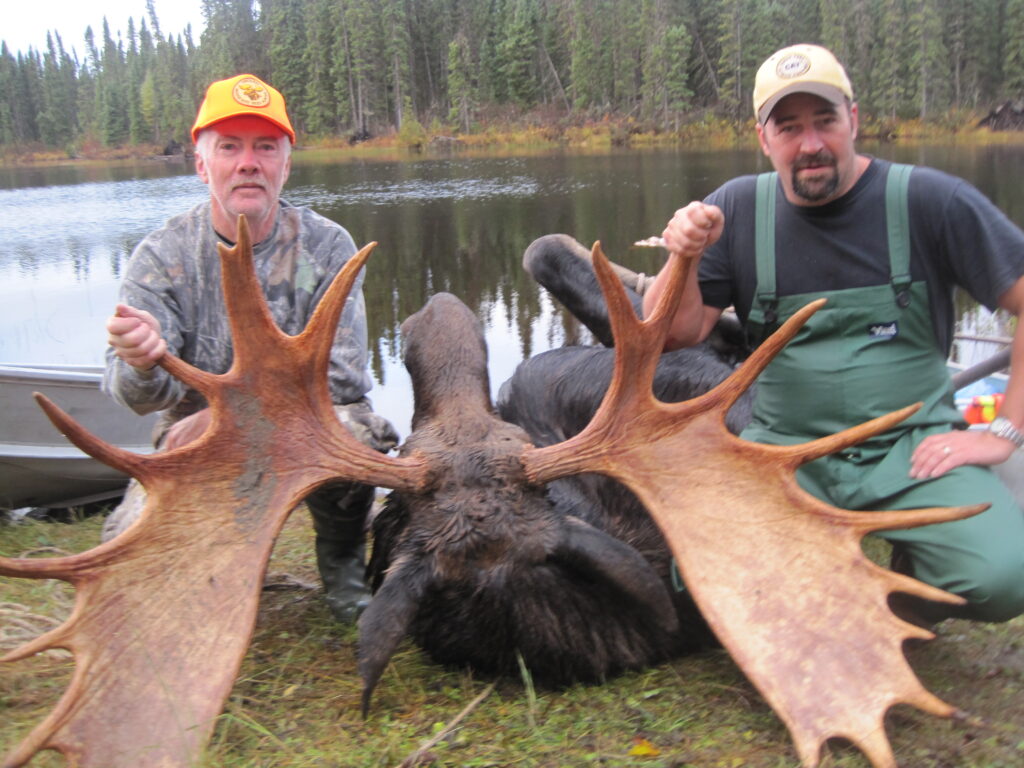
There are few things in life more exciting than preparing for a moose hunting trip in Ontario. But before you can really start glassing hillsides or calling bulls into range, you need to make sure the legal side of your moose hunt is squared away. Ontario has a structured licensing and tag allocation system, especially for non-resident hunters, and while it might seem complex at first glance, it’s actually pretty straightforward once you know the basics. With a little preparation—and help from a licensed outfitter—it’s easy to make sure you’re set up properly.
Who Can Hunt Moose in Ontario?
Moose hunting in Ontario is open to both residents and non-residents, but the process is different depending on where you live. For residents of Ontario, tags are distributed evenly through a draw system. For non-residents, you’re required to hunt through a licensed outfitter who has been allocated a certain number of adult validation tags by the Ministry of Natural Resources and Forestry. Mattice Lake Outfitters is one of those companies.
These outfitters act as gatekeepers to non-resident moose hunting opportunities. If you don’t book through one, you won’t be able to access a tag or hunt legally. That’s one of the reasons working with an experienced outfitter is so important. They manage the tag allocations, understand the regulations, and ensure everything is on order before you even start packing.
Understanding Tags and Validation
Tags in Ontario are broken into categories—bull, cow, and calf. Most non-resident hunters aim for an adult tag, which allows them to harvest either a bull or cow, depending on the allocation. Calf tags are more limited and vary by zone.
The outfitter you hunt with will assign you a tag based on what they have available for the season. These tags are valid only in the Wildlife Management Unit (WMU) they’re issued for, and the hunting party you’re part of will be restricted to that unit. If you’re hunting as part of a group, there are specific rules that allow multiple hunters to share a tag, provided certain conditions are met—this is known as party hunting.
The Role of Your Outdoors Card and Hunting License
Before you can legally hunt, you’ll need to apply for and receive two key items. The first is your Outdoors Card, which is a plastic ID card that acts as your hunting and fishing profile in Ontario. You’ll need to apply for one through the Ontario Fish and Wildlife Licensing Service. Secondly, your moose hunting license is your permit to hunt moose during the open season. It must be purchased separately from your Outdoors Card.
Once you’ve got both, your outfitter will assign you a tag if they have one available for your time frame and hunting zone. Here at Mattice Lake Outfitters, we’re responsible for keeping those records in good order, so you don’t need to worry about the paperwork getting misplaced or misfiled.
Hunter Education and Firearm Regulations
All hunters in Ontario are required to show proof of hunting competency. If you’re a non-resident, your home state or province’s hunter safety certification is usually accepted, but it’s worth confirming before you apply. You’ll also want to keep a printed copy with you during your trip, as conservation officers may ask you to see it in the field.
If you’re bringing a firearm across the border, there are a few additional steps. Non-residents must fill out a temporary firearm importation form (RCMP 5589) and pay a small fee upon entry into Canada. The form allows you to bring in up to three firearms for sporting purposes, and you’ll need to declare them at the border. Note that handguns and certain semi-automatic firearms are prohibited in Canada. Most rifles and shotguns are allowed, but always check the current regulations before traveling.
How Outfitters Help with the Process
Working with a licensed outfitter like Mattice Lake Outfitters takes the guesswork out of the licensing process. When you book your trip, they’ll walk you through the paperwork, let you know what information they need from you, and handle the tag assignment on your behalf. Since outfitters receive a fixed number of tags for specific WMUs each year, they manage bookings around tag availability. That’s why it’s smart to plan early—especially if you’re hoping for a bull tag during the rut. The earlier you book, the more likely you are to secure the tag you want.
Once everything has been arranged, your outfitter will provide clear instructions on what to bring and what to expect. By the time you arrive at camp, your paperwork will already be in order, and you’ll be ready to focus on the hunt.
Planning Ahead Makes All the Difference
Tag availability is limited, and the most popular dates tend to book up quickly. If you’ve got your sights set on a specific time of year or type of tag, it’s worth starting the process several months in advance. Most outfitters begin planning their fall hunts early in the year, and booking early gives the best shot at aligning your preferences with available tags. It also gives you more time to prepare for the other parts of the trip—gear, travel arrangements, firearms documentation, and any physical prep you might want to do beforehand.
Final Thoughts
Getting licensed to hunt moose in Ontario isn’t difficult when you work with the right outfitter. All you have to do is follow a few key steps and choose an experienced company like Mattice Lake Outfitters. Everything from tag allocation to legal requirements is easier when you’ve got someone guiding you through it. And once it’s all handled, you’ll be free to focus on what really matters: getting out there and making the most of your time in beautiful, remote Northwestern Ontario moose country. Our plentiful herds and comfortable accommodations will ensure you have a trip to remember. Call us toll free at 1-800-411-0334 or email us at mattice@walleye.ca to begin planning your trip today!
